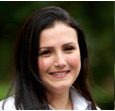Link to Pubmed [PMID] – 24129182
Int J Mol Sci 2013 Oct;14(10):20508-42
Abnormalities in melatonin physiology may be involved or closely linked to the pathophysiology and behavioral expression of autistic disorder, given its role in neurodevelopment and reports of sleep-wake rhythm disturbances, decreased nocturnal melatonin production, and beneficial therapeutic effects of melatonin in individuals with autism. In addition, melatonin, as a pineal gland hormone produced from serotonin, is of special interest in autistic disorder given reported alterations in central and peripheral serotonin neurobiology. More specifically, the role of melatonin in the ontogenetic establishment of circadian rhythms and the synchronization of peripheral oscillators opens interesting perspectives to ascertain better the mechanisms underlying the significant relationship found between lower nocturnal melatonin excretion and increased severity of autistic social communication impairments, especially for verbal communication and social imitative play. In this article, first we review the studies on melatonin levels and the treatment studies of melatonin in autistic disorder. Then, we discuss the relationships between melatonin and autistic behavioral impairments with regard to social communication (verbal and non-verbal communication, social interaction), and repetitive behaviors or interests with difficulties adapting to change. In conclusion, we emphasize that randomized clinical trials in autism spectrum disorders are warranted to establish potential therapeutic efficacy of melatonin for social communication impairments and stereotyped behaviors or interests.

